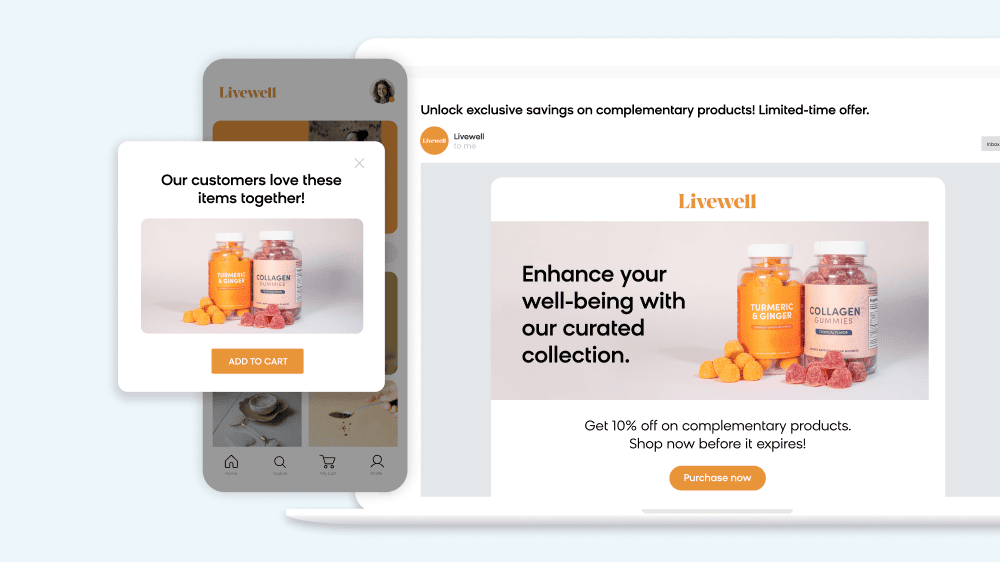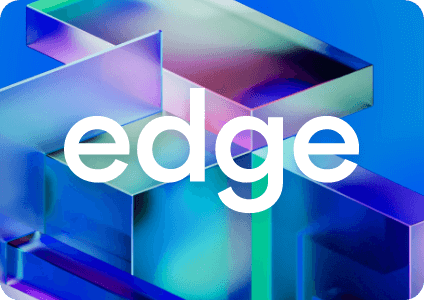Artificial intelligence (AI) is reshaping ecommerce by making operations smoother and more cost-effective. For instance, you can create personalized shopping experiences that resonate with customers, helping to build loyalty and drive repeat business. Efficient logistics powered by AI can also ensure that products are delivered on time, further enhancing customer satisfaction.
However, AI isn’t just about automating tasks. By optimizing inventory management and refining pricing strategies, you can reduce waste and improve profitability. In a fast-paced market, effectively using AI can give you the edge needed to stay competitive.
This blog will explore how AI can streamline your operations and offer practical strategies to optimize your costs.
What Is AI in Ecommerce?
AI tools for ecommerce use advanced algorithms and machine learning to enhance customer experiences and business operations.
For your customers, it can provide tailored product recommendations, 24/7 chatbot support, and a smoother, more engaging shopping experience.
From your business’s perspective, AI transforms operations. It helps you forecast demand, manage inventory, and streamline logistics. By analyzing data in real time, AI offers insights that were once difficult to access.
It can also automate routine tasks, predict customer behavior, and improve marketing efforts. This allows you to cut costs, boost efficiency, and deliver a superior shopping experience.
How Is AI Used in Ecommerce?
Here are some key ways AI is transforming ecommerce:
- Personalized shopping experiences: AI and machine learning can analyze customer interactions and behavior to deliver tailored recommendations, turning casual shoppers into loyal customers by offering exactly what they want.
- Smarter upselling and cross-selling: It can also suggest relevant products at the perfect moment to increase average order value and improve the overall shopping experience.
- Conversational commerce: AI-powered chatbots provide instant support 24/7, resolving queries and offering recommendations. This can enhance customer satisfaction and streamline interactions.
- Data-driven decisions: It also optimizes operations by analyzing data in real time, improving inventory management, pricing, and demand forecasting, leading to more efficient processes and cost savings.
Benefits of AI for Ecommerce
AI is transforming how businesses operate, offering powerful tools to enhance the online shopping experience. Here are some key benefits that AI brings to ecommerce:
- Personalized experiences: Businesses can use AI to turn customer data — like browsing habits and purchase history — into highly personalized product recommendations. By offering exactly what they want, when they want it, you’ll engage shoppers and keep them coming back for more.
- Better customer retention: When customers feel understood, they’re more likely to stay loyal to your brand. AI-powered recommendations and personalized marketing build that connection, ensuring your customers return time and again.
- Optimized inventory management: With AI, balancing supply and demand becomes much easier. Use data from past trends and market signals to predict product demand, helping you avoid costly stockouts or overstocking.
- Streamlined operations: Automate routine tasks like order processing and logistics with AI. This gives you more time to focus on growth strategies, improving efficiency and scaling your business faster.
- Higher conversion rates: Real-time AI analysis helps you make smarter decisions on product placement and pricing. By delivering the right product to the right person at the right time, you can boost conversions and improve the overall customer experience.
Ready to elevate your ecommerce game? With Loomi AI, our AI built for ecommerce, you can streamline operations and enhance customer experiences — all while effortlessly driving growth.
AI-Powered Tools for Cost Optimization in Ecommerce
Utilizing AI can drive significant efficiencies across various operational areas, leading to reduced costs and enhanced customer experiences.
AI in Inventory Management
By analyzing real-time data, AI can ensure the right products are always in stock and available when customers need them.
- Demand forecasting: By analyzing historical sales, market trends, and social media signals, AI tools predict future demand with remarkable accuracy. This prevents overstocking and stockouts, keeping your operations efficient and your customers satisfied.
- Automated restocking: When inventory falls below a certain threshold, automated systems can trigger restocking orders. This ensures that popular items are always available, minimizing the risk of lost sales and maintaining a seamless shopping experience.
AI-driven inventory management can help you maintain the ideal balance between supply and demand while freeing up your time to focus on growth.
AI in Supply Chain Management
Besides inventory management, AI can also help optimize the entire supply chain. From forecasting demand to improving delivery routes, AI can help ecommerce businesses run more efficiently while cutting costs.
- Logistics optimization: By analyzing data from multiple sources, including transactional and geographical information, AI creates a detailed view of your supply chain. This allows for optimized shipping routes, faster deliveries, and improved overall efficiency, leading to better customer satisfaction and a competitive edge.
- Predictive analytics: AI identifies patterns to help you anticipate challenges like seasonal demand spikes or potential supply chain disruptions. By adjusting operations in advance, you can ensure products are available when your customers need them.
- Cost reduction: Streamlining workflows and automating repetitive tasks across the supply chain reduces operational costs. From managing inventory to enhancing warehouse efficiency, these AI-driven improvements save time and money, boosting profit margins.
In fact, research shows that AI adopters have improved logistics costs by 15% and inventory levels by 35%.
AI Solutions for Customer Service and Experience
Improved customer experience isn’t just about reducing response times — it’s about creating meaningful, personalized interactions at scale. AI makes this possible by streamlining and enhancing how you engage with your customers.
Agentic AI and Virtual Assistants
AI-powered chatbots and virtual assistants have redefined how ecommerce businesses interact with their customers.
Thanks to the innovative capabilities of agentic AI, these virtual assistants can provide personalized, real-time communication that feels human — all while being available 24/7. Conversational AI agents can play the role of your best sales associate, offering the same level of individual attention and service in an ecommerce journey as a customer would get from an in-store experience.
In a conversational chat window, AI agents can guide every shopper’s journey — by analyzing customer behavior and preferences, these AI assistants can instantly answer questions, provide tailored recommendations, and offer timely nudges when needed.
For example, if a shopper hesitates to complete a purchase, an AI agent can offer personalized assistance, address concerns, or provide exclusive deals to encourage the sale. If items are left in the cart, a well-timed reminder or tempting offer can prompt the customer to finish their purchase.These conversational AI agents do more than respond to inquiries — they improve the entire shopping experience by anticipating needs, offering solutions, and making every interaction feel tailored to the customer. It’s a win-win for both businesses and customers.
Personalization and AI-driven Product Recommendations
AI leverages insights from customer behavior — such as searches, clicks, and past purchases — to generate highly relevant product recommendations.
These suggestions aren’t random. They’re powered by advanced algorithms that analyze data to showcase the most appealing products for each shopper. Whether it’s a “recommended for you” section or location-based suggestions, AI ensures your customers find exactly what they want, when they need it.
The power of AI-driven personalization goes beyond convenience. It creates a smoother shopping journey, helping customers discover products quickly and effortlessly — often introducing them to items they hadn’t even considered. For retailers, this translates to increased customer loyalty, higher satisfaction, and more opportunities for upselling and cross-selling.
According to McKinsey, the impact of AI personalization is clear:
- 10-30% more efficient marketing and cost savings
- 3-5% increase in customer acquisition
- 5-10% boost in customer satisfaction and engagement
Fraud Detection and Risk Management
As ecommerce continues to expand, so does the threat of fraud. To stay ahead, businesses are turning to AI for faster and more accurate fraud detection.
Here’s how AI can help:
- Smarter fraud detection: Traditional systems often struggle to keep up with fast-evolving fraud tactics. By analyzing transaction data in real time, AI identifies patterns that could indicate fraud, allowing businesses to act before any damage is done.
- Adaptive security: One of AI’s strengths is its ability to learn from new data. As it constantly updates its algorithms, it stays ahead of fraudsters and helps you prevent potential threats. This leads to fewer financial losses and increased customer trust.
With continuously refined detection, false positives (where legitimate customers are flagged as fraudulent) are reduced. Your fraud prevention becomes more accurate, ensuring smoother transactions and protecting your business without frustrating real customers.
AI-Powered Marketing Optimization
In a competitive digital landscape, getting the most out of your marketing efforts means focusing on what works. AI helps you zero in on high-performing channels, cut waste, and maximize your return on investment (ROI) by doing more with less.
AI in Advertising and Campaign Management
Effective marketing today isn’t just about spending more — it’s about being smart with your resources. AI helps you optimize campaigns by delivering the right message to the right person at the right time.
- Personalized marketing at scale: AI enables you to personalize your marketing on a large scale, making every interaction feel tailored to the customer. Use AI-driven segmentation to send personalized emails based on user behavior, like their past purchases, browsing habits, or interaction with your site. This type of targeting increases email open rates and conversions because the content is relevant to each recipient.
- Dynamic website content: Instead of showing the same content to every visitor, AI allows you to customize your website in real time. For example, returning visitors might see products they’ve viewed before, while new visitors could be shown trending or popular items. This kind of personalization increases engagement and conversion rates by making the site feel more relevant to individual users.
- Streamlined campaign management: AI-powered tools take over the time-consuming tasks of managing campaign workflows. For example, you can automate audience segmentation, optimize send times for emails, or deliver SMS messages right when customers are most likely to respond. With the ability to build and optimize campaigns autonomously, AI-orchestrated marketing is becoming the new standard of marketing operations, which frees your team to focus on more strategic work.
What makes AI so valuable is its ability to continuously analyze data and offer real-time insights. You’ll know what’s working — and what’s not — right away. This helps you reduce customer acquisition costs, boost sales, and build stronger customer relationships with precision.
Predictive Analytics for Marketing
Predictive analytics helps you anticipate customer behavior, allowing you to tailor marketing strategies based on data-driven insights. By analyzing historical data and trends, you can predict actions like purchases, campaign engagement, or site abandonment, leading to more effective outreach.
- Identify promising leads: Focus your resources on the customers most likely to convert.
- Optimize touchpoints: Deliver timely, relevant messages at critical moments in the customer journey.
- Budget wisely: Allocate your marketing spend to the highest-performing campaigns.
Predictive analytics is also key in preventing cart abandonment. By analyzing customer behavior, you can identify those likely to leave their carts and take action:
- Personalized emails: Send tailored offers or reminders to reengage customers.
- Retargeting ads: Remind shoppers of the products they left behind.
This approach helps reduce cart abandonment and increase conversions by delivering timely, personalized follow-ups.
Reducing Customer Acquisition Costs with AI
Customer acquisition cost (CAC) is the total expense a business incurs to gain a new customer, including marketing, advertising, and sales efforts. Understanding CAC is essential for making informed decisions about resource allocation and pricing strategies, directly impacting profitability.
AI helps lower CAC by optimizing marketing efforts through data-driven insights. By analyzing customer data, AI identifies patterns and predicts behavior, allowing you to target the right audience with personalized campaigns. This improves conversion rates and reduces wasted spend, ultimately lowering your CAC.
Enhancing Operational Efficiency with AI
Streamlining operations is key to staying competitive in ecommerce, and leveraging technology can make all the difference. Whether it’s optimizing your website or automating workflows, your ecommerce business can use smarter tools to work more efficiently and scale faster.
AI in Website Optimization
A high-performing ecommerce website needs to be fast, mobile-friendly, and easy to navigate. An AI tool can help streamline these processes, improving user experience and boosting overall performance.
- Faster load times: AI compresses images and optimizes code, speeding up page load times and reducing bounce rates. Sites with faster load times can see up to 2.5x higher conversion rates.
- Enhanced accessibility: AI tools improve accessibility at scale by helping you quickly add alt text to images, generate video captions, and optimize navigation for users with disabilities, making your site more inclusive.
- Improved SEO: Using natural language processing, AI suggests relevant keywords, improves meta tags, and monitors backlinks to boost your site’s search engine ranking and attract more organic traffic.
- Automated content creation: AI-driven tools generate high-quality, SEO-friendly content like product descriptions and blog posts, saving time and ensuring consistent brand voice.
Workflow Automation
AI is transforming ecommerce by automating repetitive tasks, making operations smoother and more efficient. It takes over processes like product recommendations, loyalty discounts, and basic customer support, which frees up your team to work on more strategic efforts.
With AI handling key tasks such as emailing, order fulfillment, customer service, and payment processing, your team can focus on innovation and business growth. This streamlines daily operations and delivers faster, more accurate responses, resulting in more satisfied customers.

Case Studies and Examples of AI in Ecommerce Cost Optimization
Our customers have seen impressive results by incorporating AI-driven solutions into their ecommerce strategies. From increasing conversion rates to enhancing customer experiences, AI is helping businesses achieve their goals more efficiently. Here are a few examples of how AI has transformed operations and boosted profitability:
Wolseley Boosts Conversion Rates and Order Values
Wolseley, a leading UK merchant in heating, plumbing, and cooling, needed to streamline product discovery and reduce manual merchandising. By implementing Bloomreach Discovery’s advanced search and personalization features, Wolseley optimized its site search and tailored product recommendations to customers’ needs. As a result, the company saw a 9.6% increase in conversion rates and a 25% rise in average order value (AOV). Additionally, average revenue per visitor increased by £24.17, showing how personalized experiences directly impact the bottom line.
Bensons for Beds Increases Ecommerce Sales by 41%
Bensons for Beds completely transformed its digital strategy with the help of Bloomreach Engagement. By focusing on personalized customer journeys through tailored email marketing and leveraging customer data, the company was able to provide individualized mattress recommendations and run effective retargeting campaigns. This resulted in a 41% increase in ecommerce sales year-over-year, along with a 7% jump in like-for-like sales in Q4 2022. The success highlights the power of AI-driven personalization in boosting both online and offline sales.
Check out our full library of case studies to see even more examples of brands using AI for ecommerce cost optimization.
Harness AI for Cost Optimization and Business Growth
As ecommerce keeps evolving, AI is proving essential in reducing costs and boosting business performance. From cost optimization to delivering personalized experiences, AI empowers businesses to streamline processes and maximize revenue. Whether it’s fine-tuning inventory, sharpening marketing strategies, or automating everyday tasks, AI gives ecommerce brands the competitive edge they need.
Bloomreach offers a suite of agentic AI-powered tools designed to help you achieve these goals. From personalized customer engagement to advanced site search and optimization, we provide everything your business needs to run more efficiently and profitably.
If you’re ready to harness AI for better cost management and long-term growth, request a personalized demo today to see how you can transform your operations.













